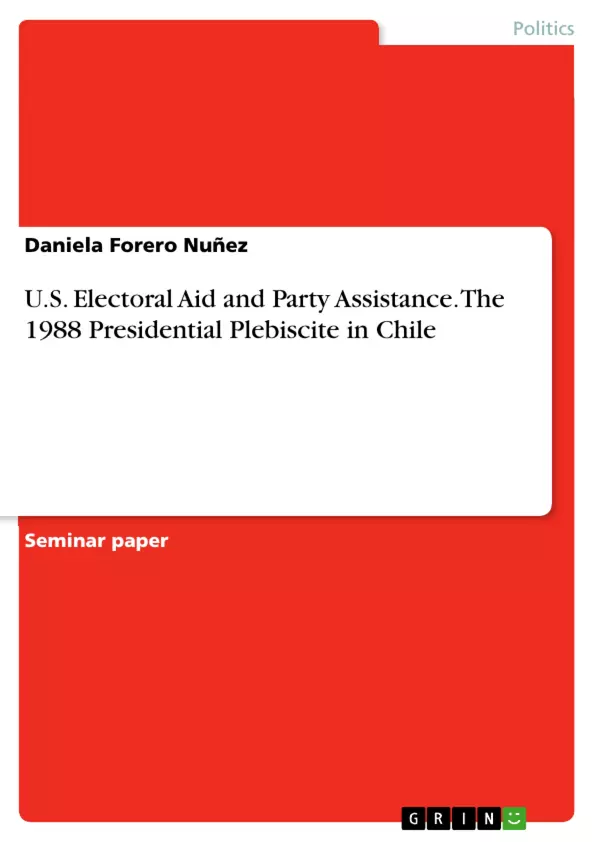The following paper aims to assess the impact of U.S electoral aid and party assistance in the outcome of the aforementioned plebiscite. Chile, unlike other cases of U.S democracy promotion in the continent, is conspicuous for its relatively peaceful democratization, which is why it has become one of the exemplary cases of assisting democracy by these means. With the national referendum on October 25th of 2020, in which nearly 80% of the electorate agreed on the drafting of a new constitution that aimed to put an end to the lasting legacies of Pinochet’s dictatorship, Chileans set a historical milestone that would make room for new political reform and thus broaden democracy in the country.
Being ranked as the second most free country in Latin America, Chile has proven to have successfully reconsolidated democratic tradition after a nearly 20-year dictatorial regime under General Augusto Pinochet between 1973 and 1990. In view of recent political events in the country, it results of vital importance to go back to the late 1980s. In this vein, the 1988 presidential plebiscite does not only represent a pivotal event for the 20th century but stands for a turning point in Chilean modern history, since it put an end to 17 years of dictatorial rule and set a breakthrough democracy.
It is worth highlighting that despite such development, the transition to democracy did not occur without difficulties. Legacies dating back from Pinochet’s era indeed continue to shape political debate until the present day. This, however, raises interesting and politically relevant questions around the long-term impact of democracy promotion, more specifically of electoral aid and party assistance.
Inhaltsverzeichnis (Table of Contents)
- Introduction
- Theoretical framework
- Electoral aid
- Party assistance
- United States as major aid provider
- Empirical analysis: Chile's 1988 national plebiscite: the end of Pinochet's dictatorship
- Chile's political background
- U. S Electoral aid and party assistance in Chile
- Assessment of overall U.S support of democracy in Chile
- Conclusion
Zielsetzung und Themenschwerpunkte (Objectives and Key Themes)
This paper aims to assess the impact of U.S electoral aid and party assistance in the outcome of Chile's 1988 presidential plebiscite. The paper analyzes the historical context of the plebiscite, the theoretical framework of electoral aid and party assistance, and the specific role of the U.S. in promoting democracy in Chile during this period. The study highlights the importance of considering the long-term impact of democracy promotion and explores how U.S electoral aid and party assistance were intertwined with broader political developments in Chile.
- The impact of U.S. electoral aid and party assistance on Chile's 1988 presidential plebiscite
- The historical context of the plebiscite and its significance in ending Pinochet's dictatorship
- The theoretical framework of electoral aid and party assistance as forms of democracy promotion
- The role of the U.S. in promoting democracy in Chile, particularly in the late 1980s
- The interconnectedness of U.S. electoral aid and party assistance with broader political developments in Chile
Zusammenfassung der Kapitel (Chapter Summaries)
The introduction sets the context for the study by discussing the historical significance of Chile's 1988 presidential plebiscite. It highlights the role of the plebiscite in ending Pinochet's dictatorship and the lasting impact of this event on Chilean politics. It then introduces the research question of the paper, which seeks to evaluate the impact of U.S. electoral aid and party assistance on the outcome of the plebiscite.
The theoretical framework chapter examines the concept of electoral aid and its various categories, including electoral observation, election administration, voter education, election mediation, and party assistance. It then analyzes the U.S.'s role as a major aid provider and the motivations behind its democracy promotion efforts in Latin America during the 1980s. This chapter draws upon the work of Carothers, who argues that U.S. democracy promotion programs are often influenced by both normative and political motivations. The chapter also discusses the role of the National Endowment for Democracy (NED) and its four main organizations, including the National Democratic Institute for International Affairs (NDI).
The empirical analysis chapter focuses on the Chilean context, examining the country's political background leading up to the 1988 plebiscite. It analyzes the specific interventions of the U.S. in terms of electoral aid and party assistance, drawing on primary and secondary sources. The chapter assesses the overall impact of U.S. support for democracy in Chile, examining both the successes and limitations of these interventions.
Schlüsselwörter (Keywords)
The key terms and concepts explored in this paper include: democracy promotion, electoral aid, party assistance, U.S. foreign policy, Chile, Pinochet's dictatorship, 1988 presidential plebiscite, democratic transition, political reform, Latin America, National Endowment for Democracy (NED), National Democratic Institute for International Affairs (NDI).
Frequently Asked Questions
What was the significance of the 1988 plebiscite in Chile?
The 1988 presidential plebiscite was a turning point in Chilean history as it ended 17 years of military dictatorship under General Augusto Pinochet and initiated the transition to democracy.
How did the United States support the democratic transition in Chile?
The U.S. provided electoral aid and party assistance, primarily through organizations like the National Endowment for Democracy (NED) and the National Democratic Institute (NDI), to support voter education and fair election processes.
What is the difference between electoral aid and party assistance?
Electoral aid focuses on the technical aspects of elections (observation, administration, voter education), while party assistance aims to strengthen political parties as institutions within a democratic system.
Why is Chile considered an exemplary case of democracy promotion?
Compared to other nations, Chile's transition was relatively peaceful and led to a stable, successfully reconsolidated democratic tradition, despite the lasting legacies of the dictatorship.
Did Pinochet's influence end immediately after the plebiscite?
No, legacies of the Pinochet era, including the 1980 constitution, continued to shape Chilean politics for decades, leading to further reforms as recently as 2020.
- Arbeit zitieren
- Daniela Forero Nuñez (Autor:in), 2022, U.S. Electoral Aid and Party Assistance. The 1988 Presidential Plebiscite in Chile, München, GRIN Verlag, https://www.hausarbeiten.de/document/1256853


